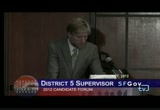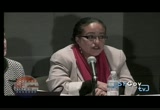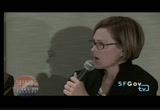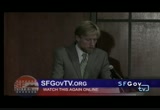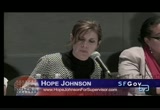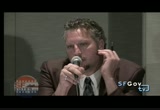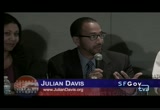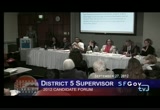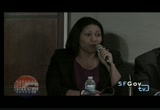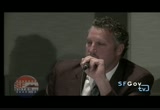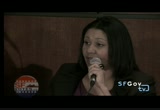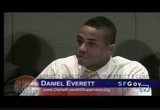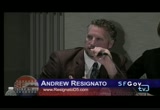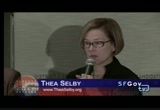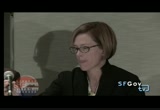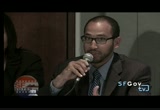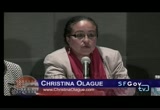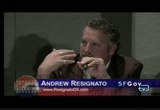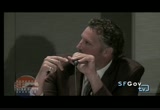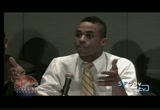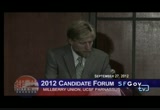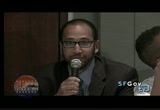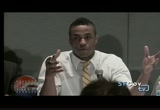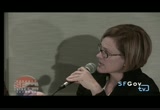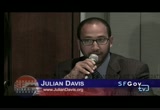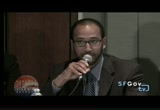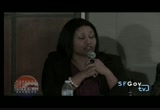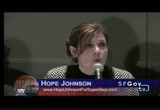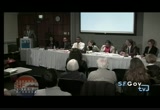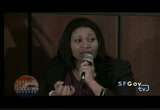tv [untitled] October 12, 2012 9:30pm-10:00pm PDT
9:30 pm
over the years there have been various proposals to allow non-citizen members of san francisco to vote in city elections. in your opinion, which city elections, if any, should be open to participation by non-citizen residents and which non-citizen residents should be allowed to vote in those elections? >> the harsh reality is that so many non-citizens still have children in our public schools here in san francisco, throughout the state of california and throughout the united states. as all of you undoubtedly know. with that being said, it's vitally important that those parents still have a say in the education of their children. i would certainly support and promote voting by those parents in school board elections in san francisco. by implication own a community
9:31 pm
college election would fit in that rubric, to support college advancement to people who have traditionally been put at the margins of our society. in those two elections, i think, are the most fundamental in the sense that they go to the root of advancement in this country and the obtaining of the american dream. so the school board and community college board i would certainly support that. >> thank you, miss olague. >> i don't think there is much to add to that. i know a couple of years ago there was a ballot measure that failed. so i would totally support bringing this back and allowing people to reconsider it. because as mr. everett said, i think it is important for people, especially those who have children in the school district and also students at the city college level to be able to weigh in on those types of questions. and i would be open to considering other elections as well.
9:32 pm
but i think as mr. everett mentioned, at a minimum, i would consider supporting and allowing non-citizens to vote in either of those two. >> here i am different. i have two children in public school and i would love to see citizens and non-citizens engaged in the school, at the school level. i think that is great. and i think we should do everything possible to engage these people at the school level, get them involved in their school. i, you know, personally from the friends that have i, who are non-citizens, they haven't been clamoring to vote for the board of education and to me if you are a citizen you get to vote. if you are not a citizen, you don't get to vote. if it's easier to perhaps we need to look at how easy it is to become a citizen, but my experience is if you want parent to participate in their
9:33 pm
children's education, get them involved in their schools. i feel a little differently at the community college level, because at that time they are adults themselves, i'm assumingand that is more like the dream act and it's an interesting proposal. >> thank you. >> the next question is for miss breed, miss johnson and mr. resignato. >> a couple of years ago then mayor gavin newsom vetoed a bill to distribute alcoholic beverages. it would be used for costs for alcohol consumption. in this year's election the city of richmond will vote on a tax for penny on sugary beverages.eqc to encourage healthier behavior and recover the cost of providing medical services to
9:34 pm
people who become sick from alcoholic abuse or unhealthy diets? >> no. >> london breed, no. [ laughter ] >> you are up first, right? >> miss johnson? >> i agree with london breed, no. i will say that the health care costs associated with alcohol and sugary drinks is what is the problem and we need to address the health care and insurance issues. i happen to be new york when mayor bloomberg announced he was going to restrict the amount of sugary drinks people can buy. people were very upset by that. i wonder how upset they would be if they knew they were collecting money because in new york they are not actually collecting money. because a lot of people who
9:35 pm
have these problems don't have a lot of money and the a lot of people that don't have a lot of money live in areas where they don't have access to healthy food and that is a lot more of a problem. now you are imposing even more money on them. if they really meant it with the sugary drinks they would do as mayor bloomberg did and not allow them to sell more than 12 ounces at one time. >> thank you, mr. resignato. >> i disagree. i am the -- when i worked in florida, i worked for former governor childs, the first governor of the nation to sue the tobacco companies for the medicaid health costs of the people of the state. i think this is a great public policy up here. diabetes is the no. 1 public health issue that we have today. and so taxes, like this, provide disincentive for people and cover the external costs that alcohol and
9:36 pm
diabetes-related health diseases are a burden on society. so i actually do agree with this very much so from a public safety perspective. >> thank you. there are a few others who want to join in. mr. davis? >> i just wanted to echo that diabetes as well obesity is a crisis in america. and we do need government to start taking leadership around the issue. regardless of the merits of this particular proposal, one thing i want to bring to city hall is a locally sourced healthy food insurance. santa clara county recently band all vending machines from their county facilities and i think we can lead by example, whether it's city hall, hospitals or our schools we should insist on healthy foods and healthy food choices and teaching our children how to grow their own food and cooking. so i would like to see an increase in community garden and an increase in the city with leadership around
9:37 pm
this issue. >> mr. everest is this your third or fourth use of the time card? >> i know i am out of these. [ laughter ] well, if we finish early i will come back to you. >> all right. >> now a question for miss breed and mr. resignato. san francisco currently provides free or low-cost health care to residents who can't afford private health insurance and do not qualify for coverage from the state or federal government? do you agree with funding this for employees who spend less for their employees health care than what the city believes is adequate? >> yes. i think it's important that we continue in this direction. i was one of those persons who grew up -- i mean my grandmother raised me and my brothers and she worked as a maid and couldn't afford health
9:38 pm
care. and luckily we had medicare and we were able to go to the doctor and the dentist. i still have my same dentist who has been my dentist since i actually had teeth. i just think it's great that kids and people who don't have access to health care have access to health care. we need to look at ways to move into that direction and i think san francisco has definitely led the way for our president to move forward with obamacare and i'm excited about that and i think we can find more innovative ways to fund this. part of that is taking the fees from the employers who have those fees who aren't using it for reimbursement and other costs that we take those fees and use them for appropriate purposes. >> mr. resignato. >> thank you chris for the health question, i will give you the $5 i owe you. [ [ laughter ] >> absolutely healthy sf is the program that created
9:39 pm
universal health coverage in san francisco. it's amazing. the problems we have had, we have had are people taking their children to the emergency rooms for primary care. and we're eliminating that through programs that make sure that everybody has health insurance. so yes, i agree with this. and i think it needs to be expanded and it's relatively cheap. and my entire public health career has been in prevention. and what happens is when people have health insurance and they are seeing a doctor on a regular basis or health care provider and getting preventative services, that saves us so much money in the end. and also, for these businesses that are having to pay, their employees will be healthier. so it's a win-win in every situation and we need to really expand and i agree with this program. absolutely. thank you, chris for the question. >> thank you. >> i just wanted to add that i have been in a toothpaste
9:40 pm
commercial, crest toothpaste commercial, as a matter of fact and because of having dental services since i was a kid through access to health care is why my teeth look like this now. so i think it's important to look at this from that kind of perspective. making sure that we have access to health care is important and finding creative ways to make sure we have access to health care is equally important. and that is what i would do as supervisor is make sure that we go after the monies that we need to make sure that everyone has access. thanks. >> thank you. the next question is for mr. everest, mr. resignato and miss selby. commissioners who voted against the plan, said that it gave san francisco a benefit that other regions in the south bay and
9:41 pm
east bay would not share. would you support san francisco using city taxpayer dollars to pay mtc for the cost of providing free muni service to young people in san francisco? in other words, if mtc isn't willing to do it on its own, should the city be paying more money into mtc to get the service out of mtc? >> as a last resort. that would be certainly the last way of funding it that i would look at. there is a continuity problem between the different transportation agencies that make it a little bit unworkable. at this present time i think one of the ways to deal with the issue is to see if the nuts and bolts of it can be tweaked a little bit to make it into a workable solution. maybe that may take a little bit more time, but i don't think as a sort of knee-jerk reaction we need to put the burden on taxpayers. with that being said it's vitally important for people to get around and especially those who can't afford and if you are a young person, i think that is
9:42 pm
a very important consideration as well. again, the focus should be on tweaking the nuts and bolts of continuity issue to find a work-around there before putting the burden on the taxpayer. >> the former mayor of bodega has a quote that says a developed country is not one where poor people buy cars, but one that rich people ride public transportation. and i believe, and i think this is one thing i have been talking about, even though i am a health guy, those affect health. the great thing about having muni be free for youth, and all youth. i don't think it should be income-tested either. is that you get young people on public transportation and they get used to it and they become your riders later on. so i think it's -- i think, like daniel said, the nuts and bolts
9:43 pm
of being able to pay for it, we have to figure out. but this is a priority. i think public transportation can transform this city into something completely [tk-efrplg/] or different with the health, public safety, and other things so we have to start thinking big. >> miss selby. >> chris i will give you my $5 as well. this was not a san francisco riders position, but i think we should have free muni for youth and i believe it should be for all youth for a slightly different reason than andrew. it's kind of the idea of social security. i think when we have rich people and poor people getting benefits, it sticks around. so we have a lofty goal, 62% of
9:44 pm
our trips are taken in cars and we want to drop this to 50%. this is a goal we have had for many, many years and we're going to have do a lot to make that happen. one thing we're going to do is that we don't have school buses anymore for most our schools, so to have them take the bus, have them bike and walk. it's only $8.9 million. we can get $76 million if on average we speed up muni by one miles per hour. >> thank you. we have a few more transportation questions here. next one is for mr. davis, miss olague and mr. resignato. the agency has proposed to meter street parking on sunday afternoons. do you support the replacement of conventional parking meters with variable rate meters in district 5 and would you
9:45 pm
support metered parking on sundays? >> i'm not a huge proponent, but i do support the mandate parking. i think it's a viable source of revenue for mta. there are other some of which have been talked about and some are already being worked on including congestion pricing and a downtown transit tax assessment district because downtown businesses are the greatest benficiencies and should be paying their fair share in terms of busing their employees on a daily basis. i think muni has had a shortfall ever since the state gas tax money, since we lost that money and we have to look at how we're going to solve muni's long-term budget problem and get a muni system that is efficient and runs on time and not cutting fares while expanding fees.
9:46 pm
we can do that with a vehicle license fee on the local level, with a gas tax on the local level and i would like to work with our state legislators to make that possible here in san francisco. >> thank you. miss olague? >> well, again, we have, as most of you know a transit-first policy in san francisco, and in my conversations with the mta, that is their justification for wanting to impose these fees or parking meter usage and what not. but i think that even though i have been a huge proponent of transit first for a number of years and i do support some of this to some degree. on sundays, when i talk to people, some who have come only to san francisco on sundays to attend church, and you know, they have been displaced from their communities, they have had to leave the city. and it really does impose a certain hardship on people who
9:47 pm
are church-goers. and also, small merchants are very, very concerned about the impacts it's going to have on their businesses. so i think that i wouldn't want to move too aggressively forward with some of these policy changes without an intense conversation with neighbors, with the churches, and with the merchants. >> thank you. mr. resignato. >> i agree. we have come about the idea that parking is free and what that has done is caused scarcity with parking and also made people more likely to use their vehicles than public transit. so we have to move towards market-rate parking, i think. if you want to be -- and this is probably not a popular position, but the price of a residential parking permit is too cheap, actually. i'm an economist, too. so if you spend -- we need to raise that actually and we will find
9:48 pm
that a lot of people may substitute out of using their vehicles. because it might be too expensive. and also, i want to talk about the minimum parking requirements for apartments for new development. and i think we need to get rid of them and start building developments without so much parking. so that we can move towards people taking public transportation. can i just say one more thing? >> do you want to use your time card? >> i will use one. [ laughter ] >> shoot. i don't -- i agree with supervisor olague that sunday on sunday, i think there needs -- we need to ease into it. i really do feel like people need a break from parking meters. >> i think we need a little market in time cards here. [ laughter ] >> that would be cool. >> anybody want to sell a time card to mr. everett?
9:49 pm
[ laughter ] >> go ahead. >> thank you. you know folk in some conversations it's better to have all of your cards on the table. no pun intended >> [ laughter ] that being said an article finally came out in the san francisco guardain that said we want to tax people out of their cars. fair play. once you have the argument in place, then we can actually talk about. it that is what this is about. the health benefits are such that folks should essentially be taxed out of their cars. i don't take that position. i think that it essentially breaks the backs of the working poor in this city and it's just another example of how progressive politics in this city are not really kind to the working poor, and in some instances, in many instances, people of color. that being said as far as the
9:50 pm
sunday parking meter thing, you know what? religion aside, least one day of the week it would be nice if san francisco city government was off the backs of everyday residents. [ applause ] >> i like that. thank you. >> all right. next question. san francisco's transportation inserve drivers, bicyclists and transit uses. bicyclists are not charged for the privilege of using or parking on public roadways. mr. davis, mr. everett and miss selby should the city assess fees on bicycle owners to pay for transportation improvements? >> i don't think so and i will tell you why because the city is moving in a direction that i
9:51 pm
think they should be which is encouraging more people to get out of their cars and to get onto bikes and to use our streets and walk the streets. you know, i think we need to be visionary about getting and meeting our goals. we have a goal of 20% of all trips in san francisco being taken on a bike by 2020. the bike coalition, which is one of my endorsements, as well district 5 group have been advocating for this connecting the city plan, the bike coalition for cross town bikeways to make our streets safer for bike riders. i think we need to move more in that direction and assessing fees on bike riders for ridion bikes is san francisco is not going to work towards the goal we have in the city now. >> thank you, mr. everett? >> i don't -- certainly i
9:52 pm
want to protect the right of people to own and park vehicles here in the city and county of san francisco. i think that is vitally important. that being said, i think it would be disingenuous not to state the obvious which is cars damage our roadways certainly a lot more than a bicycle or a pedestrian would. and therefore, a larger, certainly larger amount of the money and fees should be paid by car owners. that is just logical. i think that should be the position of the city and county. >> miss selby? >> when i look at bicycles, i actually like to look at bicycles in two different ways. i think they are recreational bicyclists and then commuter tourists and i think it's actually quite confusing to bike in san francisco. especially if come from
9:53 pm
somewhere else you may have no idea what is going on. so one we have an extra fee for people who come from -- who are tourists, maybe an extra dollar that they may when they rent the bicycles, so they can have some idea of how to bicycle in san francisco. because a lot of bicyclists don't even know that you can't ride -- it's not legal to ride on the sidewalk, for example. and i personally i'm kind of scared when i ride in san francisco. so for me, if you are looking to assess fees, i would assess fees perhaps to the tourists, who are coming in to town, and have as part of that assessment an educational process of how do we ride bicycles here in san francisco? because it's kind of confusing. >> thank you. >> the next question is for miss breed, mr. davis and miss johnson. a recent civil grand jury report called the san francisco ethics commission essentially a sleeping watchdog. at the request of supervisor
9:54 pm
campos the city requested a comparison of ethics in san îg:]ñand los angele identifying ways our ethic laws could be strengthened. as supervisors, what if anything would you propose to strength the city's ethics laws. i will start with mr. davis. >> strong ethic laws are essential. what is happening with our sunshine task force and hope davis can speak to this since she recently served on the task force. these need to be strengthened and one problem we have is around enforcement. i would like to see more of the ethical violations of larger committees, some of which are operating, for instance, in some shady areas of law. one was the run he ed run, the
9:55 pm
committee for mayor ed lee last year and the campaigns that aren't swaying the politics of city, the way the run ed run campaign did. so i think that is one the issues and improving our good government and ethic laws in san francisco. >> miss breed, would you like to address the question? do you want me to repeat it? >> yes. >> sure. a recent chief civil grand jury report, at the request of supervisor campos the city conducted a comparison of laws identifying ways our ethic laws could be strengthened. as supervisor, what would you propose if anything to strength the ethic laws?
9:56 pm
>> i'm really happy about this kind of question. i teach ethical leadership for a program that trains democratic women to run for office. when i went to university here in san francisco one course i took to get my masters was a course in ethical leadership. i think it's important that ethics are at the core of our educational system starting from pre-k. and i think in terms of strengthening laws here in the city, we need to look at a stronger, more kind of law-based, educationally-based ethics system that really, truly is around enforcement. and not what we witnessed in the past, which is somewhat of a circus. i think violating ethical laws in our city, there needs to be real punishments that make sense, but i think we need to strengthen those laws
9:57 pm
aggressive and to look to our educational institutions in order to make it a more concrete department in our city. >> thank you. miss johnson? >> i still -- the sunshine ordinance task force refers violation of the open government laws to the ethics commission between 2004 and 2011, we had referred -- i was on it ÷ cases went to them. and they haven't heard -- they have only heard one out of those cases. they found a violation and they requested that the mayor remove the president of the library commission. so we need an ethics commission that is willing to enforce our laws. here in san francisco, they don't have to start reporting certain campaign financing until it's $5,000. in los angeles, that is $1,000. so we could reform the laws in that way. there is a possibility that we
9:58 pm
should just eliminate the ethics commission. it's appointed by the departments that are at city hall. so they appoint their friends, which makes it inherently somewhat difficult for them to perform the job they are supposed to firm. this was created in 1993 and it was said to have created an extra layer of bureaucracy and i think that is playing out. >> thank you. experts say there is a 62% chance that an earthquake causing widespread damage will strike san francisco, or the greater bay area within the next 30 years. what new polices should the city institute in order to minimize the human and economic costs of the next big one? this is a question for miss breed, mr. davis and miss johnson. >> i think that we all -- we are already doing some of those things. for example, many of the new buildings, we're making
9:59 pm
them as sturdy as we possibly can. we're doing a lot of retrofit projects. part of the work that we do -- i raised over $2.5 million to renovate the african-american art and cultural complex. a lot of that money was used to do retrofit and i think a big part of what we have do as a city is to make sure we take care of our assets and facilities and make sure that we have and are communicating to people how they protect themselves and keep themselves safe and secure when an earthquake hits. and they may not have access to emergency services. i think the training that exists and that is being brought into many communities could really help us learn how to survive on our own, so that we're taking care of one another when that happens, but more importantly we need to ensure we're taking care of our assets. >> thank you. >> there e
124 Views
IN COLLECTIONS
SFGTV: San Francisco Government Television Television Archive
Television Archive  Television Archive News Search Service
Television Archive News Search Service 
Uploaded by TV Archive on

 Live Music Archive
Live Music Archive Librivox Free Audio
Librivox Free Audio Metropolitan Museum
Metropolitan Museum Cleveland Museum of Art
Cleveland Museum of Art Internet Arcade
Internet Arcade Console Living Room
Console Living Room Books to Borrow
Books to Borrow Open Library
Open Library TV News
TV News Understanding 9/11
Understanding 9/11